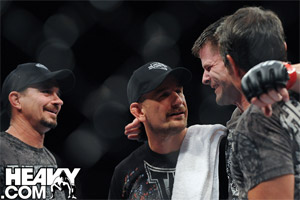Heavy.com: You mentioned Hire Heroes. A lot of fighters claim to be full time fighters, where they simply train but don’t do anything else with their lives. But yet you manage to do this charity work full time while still training to fight on the highest level this sport has to offer. How do you juggle those priorities?
Stann: It’s not easy. In the last year it’s gotten very difficult. But even in the weekends when I’m not working, I have to stay busy. It’s just the person I am. I’m very accustomed to doing something, and if my mind isn’t engaged, then I will look to find something that will engage it.
But there are a lot of hours in the day, and even when I’m in full-blown training camp for a fight where I’m training at least two to four times a day, there is only so long that you can physically train your body before your brain is going to shut down and you’re not going to retain any more of that information. And in between those physical exertion periods, there are a couple of hours where you can be working. You can be answering emails. You can be on conference calls. You can be thinking and developing new procedures for your organization.
And that’s what I do. It’s actually easier when I’m in full training camp because most of the time I’m actually away from my family. So I’m not thinking to myself “well, I need to get out of the office and get done with training because I need to get home to my kids.”
Heavy.com: Speaking of training — how is your relationship with Greg Jackson? The book makes me feel like the first time you stepped into Jackson’s gym in New Mexico, you’d finally found your home. Is that how it feels for you?
Stann: It really is. I am very close with both Greg Jackson and Mike Winklejohn. And they both really understand me and the type of person I am, and I have a pretty good understanding of the type of men that they are.

Coach Winklejohn does the same thing. He’s already a very no-nonsense kind of guy. He only says what needs to be said. He doesn’t have a lot of time and he’s very busy, so everything he does and says matters a lot. He’s very calculated and a very tough individual, and I really respect that. I respond very well to both of their styles of coaching.
Those are gentlemen who I believe would be mentors of mine in just about any realm and not just fighting.
Heavy.com: Let’s shift for a second to Operation Matador. Normal people would have a tough time relating to stories such as this one, where you go through horrific ordeals and conditions that only a few people ever experience in their lifetime. How did the experience as a whole change you as an individual and how does it inform your life now as a regular citizen?
Stann: I definitely think it changes you to a certain extent. But I believe that we have a choice when we come back from combat. You can either be the same person you were when you left, or you can allow the experience of combat to change you and follow you in a negative manner. I was very conscious of that choice when I came back. I’m a very active thinker. I like to think about things. I know that I made that choice and I wanted to be sure that these experiences didn’t change me in a negative way.
I say the same thing to these companies that I talk with about hiring veterans. There is nothing I’m ever grown to be thrown in this life that will be as difficult or as complicated as what I went through during those times. I don’t fear anything other than something happening to my wife and children, and I don’t think I ever will.
Heavy.com: For me, it’s still a dreadful experience looking at the newspaper to see if any of the friends I made while in the military have died in combat. Do you struggle with the same thing?
Stann: Yes. Every day. At this point, it’s also for every young man or woman who is over there. I shrink every time I see it, but I understand that we all raised our hands. We knew the rules of the game before we got involved and took that oath. The biggest thing I have to deal with is the guilt of not still being over there. I struggle with that a lot of times, knowing that I could have a positive impact over there in Afghanistan or Iraq right now, but I’m not there. Sometimes I feel like I’m selfish because I’m going to be a family man.
Heavy.com: What is the one thing you hope readers take away from your book?

Because no matter what we do, what happened has already happened. Whether we make a mistake or if something happened to us that wasn’t fair, we have to realize that we do have to move forward, that we have to make the right choices to turn any negative into a positive — even if was horrible and the only positive you can get out of it is that it made you a better person in the end, then that is what you need to take away from it.
But there’s nothing that is so catastrophic that we cannot recover from it.